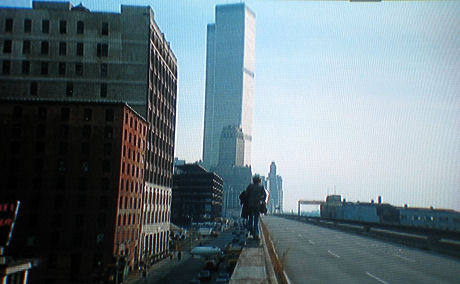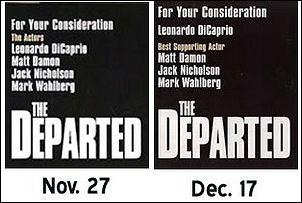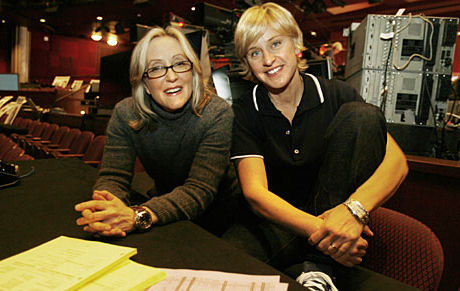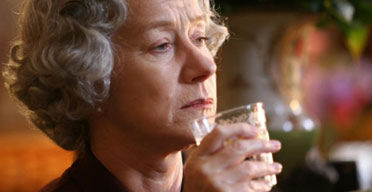
Monitor capture from Wim Wenders’ The American Friend (1977) — Dennis Hopper walking downtown on West Side highway.

In a last-ditch attempt to squeeze intrigue out of a dying Oscar season, Rotten Tomatoes has put up an interactive feature called “The Best of the Best Pictures,” a list of 78 Best Picture Oscar winners ranked by how well-reviewed they are — not at the time of their release but (mostly) based on what today’s critics have written. The worst reviewed is Cecil B. Demille‘s The Greatest Show on Earth. The all-time best reviewed is Francis Copola‘s The Godfather; the second best is Elia Kazan‘s On The Waterfront.

“I know less and less about who I am, or who anyone else is.”
The problem isn’t that Warner Bros. marketers waited too long to start emphasizing Leonardo DiCaprio‘s Best Actor performance in The Departed in trade ads. (It was the problem but no longer, I mean.) The problem is that The Envelope‘s Tom O’Neil, composing this comparative piece of art for an article he wrote about Leo’s once-upon-a-time Oscar hopes, didn’t properly tweak the November trade ad so it looks as sharply focused as the December one.

I realize that FORA is an acronym for something, but I don’t know what. (Federation of Ravenous Alpha-Dogs?) Obviously it’s a web TV thing. They sent me an excerpt of Little Miss Sunshine screenwriter Michael Arndt talking about how how and why he was briefly fired off the project. No, wait…there’s an entire program of Arndt talking about everything. You just have to click on it. It’s free to watch. (Apparently.)
In an interview with USA Today‘s Anthony Breznican, the reigning Oscar Night ladies — producer Laura Ziskin and host Ellen DeGeneres — are a study in opposite attitudes and sensibilities. DeGeneres is a brainy, free-associative, improvisational wit. Ziskin wants to be hip and alpha-like, but she sounds like an affluent ooh-lah-lah control freak who’s terrified (or at the very least alarmed) by spontaneity.

The Oscar show, I’ve just realized, is going to be a kind of war between the two. Ziskin will dominate, of course, being the big-shot producer in the control room, but many of us are going to be pulling for DeGeneres to somehow make things a little more loosey-goosey than Ziskin might prefer.
Freewheeling DeGeneres: “I came up with a really fun idea for the end of my monologue that I think is going to set this room off.”
Humorless control-freak Ziskin: “This is the first I’m hearing about it.”
Freewheeling DeGeneres: “I want somebody to do a one-armed pushup. I want somebody to streak.”
Humorless control-freak Ziskin: “Those days are gone.”
Freewheeling DeGeneres: “It’s just that everybody is so body conscious: I would streak, but I’m bloated.’ ”
Humorless control-freak Ziskin: “People are so nervous, so terrified, not just the nominees, but the presenters. She releases us, makes us happy and forget about ourselves.”
Freewheeling DeGeneres: “I didn’t realize that was my job. I’m going to have to change my entire monologue.”
And yet Ziskin says to prepare for a 210-minute running time, minimum. “You get your popcorn and invite your friends over. Or get in bed by yourself or with someone you like, and you wait to see what’s going to happen.”
Freewheeling DeGeneres: “We’re taking all the seats out of the theater, and we’re bringing in beds, popcorn and pajamas. We’ll pair everyone up, real nice.”
Washington Times film critic Gary Arnold trumpets the virtues of the Paul Greengrass‘s United 93 — good move — but in the same piece calls The Departed “terminally wretched,” praises Doug McGrath‘s Infamous as “far and away the superior biopic about Truman Capote” and describes Inconvenient Truth avatar Al Gore as “an alarmist pseudo-authority.” I used to admire Arnold when he was the critic for the Washington Post back in the ’70s and ’80s. I don’t know what happened.
Mediabistro.com on all the people I didn’t talk with or take pictures of at last night’s Radar magazine party at the Standard. I mostly stood around and talked about new scripts with a couple of very cool enterprisers, and otherwise tried to smile and not scowl until 9:30 pm or so.
A brotherly pat on the back to all those on Oscarwatch.com’s Final Oscar Prediction Chart who are predicting Alan Arkin to take the Best Supporting Actor Oscar — The Envelope‘s Tom O’Neil, Award Speculation, Buzzmeter, Spencer Shannon, Toronto Star‘s Peter Howell, Indiewire‘s Eugene Hernandez, N.Y. Daily News critic Jack Matthews and Trailer Spy‘s Julie Stone. Hollywood Wiretap‘s Pete Hammond (who didn’t send his picks into Oscarwatch, but he’s standing by Arkin in his latest Hollywood Wiretap column)
Almost everyone else is sticking with Eddie Murphy, and two or three stragglers are picking Jackie Earl Haley.
Good things occasionally happen to bad people, and you just have to roll with this when it happens. If Murphy wins, it will be because the anti-Murphy contingent didn’t rally around an alternative with enough uniformity. If you were to conduct an instant e-mail poll of all Academy members right now, Arkin would be the victor…but he only began to really surge over the last two or three weeks. The Movie Gods are, of course, foursquare against Murphy, but they were also pulling for Brokeback Mountain winning the Best Picture Oscar last year.
Eight or nine days ago, First Showing’s Alex Billington paid roundabout tribute to 300, a film he believes is waaay ahead of its time, by listing a dozen motion pictures that were similarly ahead of the curve in their time and place. But with the exception of Mike Judge‘s Office Space and Fritz Lang‘s Metropolis, the films Billington lists are actually fanboy standard-setters. They did something fairly fresh and striking that led to commercial paydirt, and everyone followed suit in order to get in on a profitable new thing.
Films that are truly ahead of their time are most often ignored or scorned — only later do people say to each other, “Aah, yes…that film was onto something….I should have paid closer attention” A good example of a film far ahead of its time is/was John Frankenheimer’s The Manchurian Candidate, which searingly satirized McCarthyism, foresaw the assassinations that would eventually color the American political landscape of the ’60s, and anticipated the political paranoia which would permeate the culture in the early to mid ’70s. Another example in this vein would be Michelangelo Antonioni‘s L’Avventura.
Billington’s list of standard-setters are Psycho, 2001: A Space Odyssey, Jaws, Star Wars, Tron, War Games, Terminator 2, Jurassic Park, The Fifth Element, Starship Troopers, Office Space and The Matrix.
Why do British actors often seem much more accomplished than their American cousins? The Guardian‘s Charles McNulty boils the answer down to two words — theatrical training — which allows for all kinds of delightful tonalities and wonderfully resonant deliveries, as well as the ability to make a line work on more than just one level.

“It’s hard not to marvel at the virtuosic command of speech” that British actors possess, “the way Judi Dench, Helen Mirren and Peter O’Toole make music out of spoken thought,” he begins. “Steeped in Shakespeare and a culture committed to live performance, they have by necessity developed their physical instruments and, in particular, that region of the body that lies between the back of the throat and the tip of the tongue.
“Listening to Dench narrate, from her character’s perspective, the lurid events unfolding in Notes On a Scandal is like listening to a Stradivarius. You can practically feel her vocal chords luxuriously vibrating as she unfurls a commentary that is at once ruthlessly aggressive and perfectly civilised.
“And in Venus, when O’Toole’s Maurice recites — no, verbally caresses — Shakespeare’s famous Sonnet 18 (‘Shall I compare thee to a summer’s day?’) to the young woman he has fallen haplessly in lust with, storm-clouds of emotion blow in, as if his articulation carried the very beauty and loss animating the poem’s vision.
“But it’s not just glorious sound that sets British veterans apart. They invite us not just into their characters’ minds but into their intricate thought processes as well. It’s not a strictly realistic affair. These talents are drawn from a theatrical heritage that recognizes drama as more than a slice of life. [And yet] too many U.S. actors have become enslaved to a form of behavioral banality in which the highest value is placed on mimicking everyday life; at its worst fetishising the commonplace at the expense of the revelatory.”